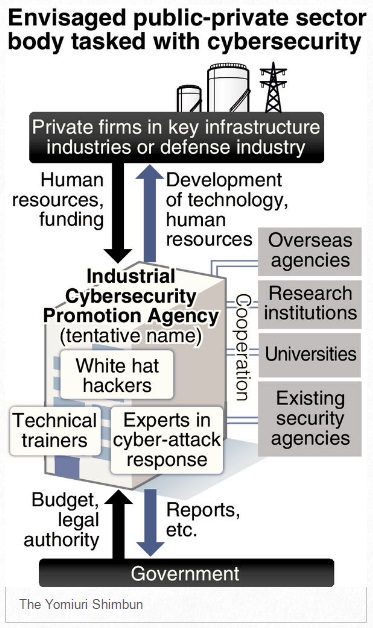Kikuo Hayakawa , NOST Tokyo (Innovatie Attaché Netwerk Tokio)
Origineel gepubliceerd op de site van RVO.
De Japanse regering krijgt een nieuw publiek-privaat agentschap voor cybersecurity-expertise. Het nieuwe agentschap wordt verantwoordelijk voor de bescherming van kritieke infrastructuur tegen cyberaanvallen. Ethical Hackers worden opgeleid om overheid en bedrijfsleven beter te beschermen richting de Olympische Spelen van Tokio in 2020. De funding en expertise komt van overheid en bedrijfsleven.
The Japanese government has said it will launch a new cybersecurity-agency: The Industrial Cybersecurity Promotion Agency (provisional name). Its job will be to lead the development of countermeasures against cyber-attacks on critical infrastructures such as electricity, gas and other industrial sectors that are believed to be increasingly exposed with the advent of the Internet of Things. The new agency is expected to give a boost to the development of human resources, cyberspecialists in the field of ethical hacking (socalled white hat hackers) and fund and coordinate research on advanced cybersecurity measures and technologies. The government plans to establish the agency in 2017 or the first quarter of 2018. Its first big priority will be to strengthen relevant measures ahead of the 2020 Tokyo Olympic and Paralympic Games.
Full (English) text
Japan is increasingly targeted by email viruses and ransomware attacks which are designed to extract valuable data from companies and organizations. Ransomware-related complaints from Japanese companies increased by 40 times (!) in 2015, according to information from security company Trend Micro. Actually, Japan needs at least 22,000 additional information-security-related engineers to provide comprehensive protection for its industries and critical infrastructures, according to Japan’s Information-technology Promotion Agency (IPA).
Some 140,000 of existing engineers are lacking the necessary expertise (1). Meanwhile, there is a growing thread of dataleaks from governmental organizations and companies. Particularly vulnerable and increasingly at risk of cyber-attacks on critical infrastructures such are electricity grids, gas pipelines, and (petro)chemical facilities. Based on the situation, the Japanese government is planning to launch a new agency (provisional name: Industrial Cybersecurity Promotion Agency) to lead the development of countermeasures against cyber-attacks on critical infrastructures (2).
The new cybersecurity agency, an extra-governmental body that will be under the jurisdiction of the Ministry of Economy, Trade and Industry, is expected to lead the development of human resources, such as white hat hackers, and research on advanced cybersecurity measures. It will be staffed with dozens of officials. Funding will come both from the government and the private sector, specifically companies that own critical infrastructures, including the defense industry.
The government aims to promote the development of cybersecurity-related human resources, know-how in companies, as well as response measures, through this agency. The agency’s research activities will include cutting-edge cyber exercises and other matters based on real-world cyber-attacks cases in cooperation with research institutes, universities and the existing security agencies and foreign agencies such as the U.S. Department of Homeland Security. (Fig. 1) The government plans to establish the agency within 2017 or before March 2018 to strengthen cybersecurity measures ahead of the 2020 Tokyo Olympic and Paralympic Games.
Figure 1. Structure of the new public-private Cybersecurity agency (source: Yomiuri Shimbun)
Sources:
- Nikkei Asian Review: Japan’s tech industry building cybersecurity muscle
- The Japan News: ‘White hat hackers’ to get official support








